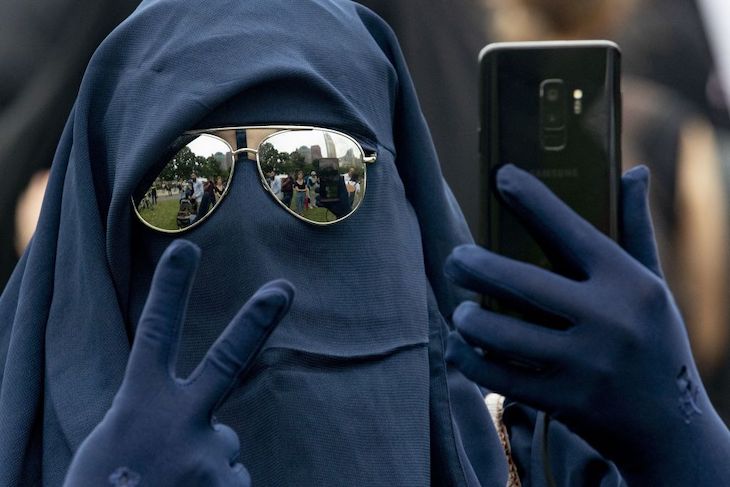MPs from Nigel Farage’s Reform party are calling for a burqa ban in Britain. Sarah Pochin, who won the Runcorn by-election last month, asked Sir Keir Starmer in the House of Commons this week if he would consider outlawing the garment. Her demand attracted the ire of Reform chairman Zia Yusuf, who has since stepped down from the job after saying the idea was ‘dumb’. Labour MPs, who shouted ‘shame’ at Pochin, also didn’t like the idea. But those who suggest that it is ‘Islamophobic’ to restrict the burqa are under a misapprehension.
The number of Muslim-majority states outlawing the face veil is increasing
After all, at least ten Muslim-majority countries have enforced bans, not just on the burqa, but also on the niqab, a partial face covering. These include Algeria, Azerbaijan, and Bosnia, encompassing ethnic, political, sectarian, and geographical diversity in Muslim populations that have restricted the garment in public spaces. Some of these Muslim states also have bans in place for the hijab, the Islamic head covering, in legal and public institutions that limit the display of all religious symbols. The number of Muslim-majority states outlawing the face veil is increasing.
Kyrgyzstan recently banned the burqa and niqab, with the country’s Muslim council calling it ‘alien to our society’ and a ‘threat to public safety’. Last year, a similar decree was issued in Tajikistan. Historically any policymaking curbing these veils in former Soviet Muslim-majority states have been discredited as a ‘post-communist’ hangover of the targeting of religion in general. But these recent mandates highlight a growing number of countries implementing laws designed to counter Islamist extremism.
The burqa, which can pose an obvious security risk given that it completely hides one’s identity, has been deployed by jihadists to launch numerous raids around the world, notably suicide bombings with the garment used to hide explosive materials. Burqa-clad jihadists affiliated with the Taliban have carried out scores of raids in Afghanistan and Pakistan. Chad outlawed the burqa, with similar regulations also enforced in other African countries, as part of a security strategy to fight Boko Haram. In August, the Somali police seized hundreds of niqabs in a security operation, prompting a ban in the Jubaland state.
Security was also the focus of the argument put forth by the Reform MPs in the Commons.
‘Given the PM’s desire to strengthen strategic alignment with our European neighbours, will he in the interests of public safety follow the lead of France, Denmark, Belgium and others and ban the burqa?’ asked Pochin.
These laws in other European states, which have targeted all face coverings, not just the niqab or burqa, have predictably faced cries of ‘Islamophobia’. Yet it is ironic that counter-terror laws applied to all citizens are criticised in a way that Muslim-majority states are not when they pass policies aimed specifically at these garbs.
What is also evident is that more Muslim states can deem these sexist coverings, designed to erase female identities, as not belonging to their society than European states. Tajikistan’s Council of Ulemas has called the niqab and hijab, ‘clothing foreign to Tajik culture’ with the government deeming bans on these garments necessary to ‘protect national cultural values, and prevent superstition and extremism’. Kyrgyzstan’s Spiritual Administration of Muslims too dubbed the niqab a ‘foreign concept’ for the country. Officials in Senegal and Chad have said it ‘does not represent our culture’.
If Asian and African countries where Islam has been the majority religion for centuries can call the burqa and niqab ‘foreign’ to their lands, is it so preposterous to say the same in the UK and Western Europe?
Even a literal reading of the Quran does not arguably mandate the face veiling, which is why Islamic clerics in various Muslim states have backed the burqa ban. The Quranic definition of satr, or parts of the body a Muslim has to conceal, does not typically include the face. The cultural practice of donning the face veil predates the advent of Islam in Arabia. It was revived after the advent of Salafi strain of the religion, a 19th century puritan movement that influenced jihadist groups like the Islamic State, al-Qaeda, and Boko Haram. Many feminist voices from Arab and Middle Eastern states have long condemned the burqa and niqab, protesting against these garments, even prompting bans in countries like Tunisia.
Instead of simply dismissing a burqa ban, the UK government should listen to progressive voices within the Muslim community who condemn such clothing as a tool to suppress women. While all citizens in liberal democracies should have absolute freedom to choose how they wish to dress at home, any public spaces and institutions that mandate universal dress codes should make no exception for any religion. This is especially true when public safety and security is at stake. There’s nothing ‘Islamophobic’ about calling for a burqa ban.







Comments